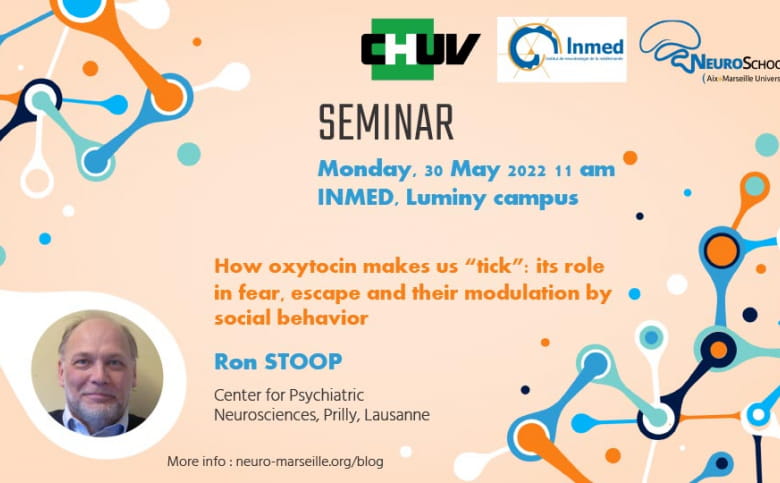
NeuroSchool seminar: Ron Stoop
How oxytocin makes us "tick": its role in fear, escape and their modulation by social behavior.
Monday, May 30, 2022, the NeuroSchool PhD Program will invite Ron Stoop (Center for Psychiatric Neurosciences, Prilly, Lausanne, Switzerland) for a seminar entitled “How oxytocin makes us “tick”: its role in fear, escape and their modulation by social behavior“.
Abstract
In my talk I will discuss how oxytocin affects our behavior at different levels by its peripheral and central effects. Starting from the discovery of oxytocin effects on inhibitory circuitry in the central amygdala (CeA) through which it reduces fear (Huber et al., 2005), I will trace this regulation of the CeA back to its projections from the hypothalamus (Charlet et al., 2012) and show how social contact can affect these hypothalamic projections and buffer the auditory conditioned freezing responses (Hegoburu et al., submitted). I will then discuss how oxytocin can selectively inhibit specific projections from the CeA to the brainstem that underlie freezing, without affecting other behaviors (Viviani et al., 2011). Building on these findings I will then present how oxytocin can promote escape during active avoidance of an imminent threat in rats and translate the translation of this work into humans with a rare mutation that leads to partial bilateral calcification of the amygdala (Terburg et al., 2018). Finally, I will present some latest findings on mechanisms underlying the recruitment of ensembles of oxytocin producing neurons in the hypothalamus that we are currently studying during lactation.
Monday, May 30, 2022, at INMED (Luminy)
- 10:00 am – Discussion among students to discuss the papers – For Ph.D students only – INMED (Luminy)
- 11:00 am – Seminar – Open to all – on site: INMED (Luminy), conference room
- 12:30 am – Special discussion time with the speaker – For Ph.D students only – INMED (Luminy)
📢 Ph.D. Students, register on AMETICE for your hours to be counted. Attendants get 3 hours, chairpersons 4 hours.
Register and join us for a pizza after the talk
Our speaker

Ron Stoop received his B.Sc. and M.Sc. in Biophysics from the Radboud University in Nijmegen. He subsequently went as visiting scientist to Tsinghua University in Beijing to become instructed in the (then state-of-the art) whole-cell patch-clamp recording technique from Profs. Zuoping Xie and TePei Feng. From there he continued with a Ph.D. thesis with Prof. Muming Poo at Columbia University in New York. After a postdoctoral fellowship at the Glaxo-Wellcome Biomedical Research Institute in Geneva with Prof. Alan North he started his own research group at the University of Lausanne. Since 2004, he has joined the Center for Psychiatric Neuroscience (CNP) in Cery, consecutively as group leader, assistant-director and associate professor and continues to work there to translationally study fear in rodents and humans.
His research has shown how the neuropeptides oxytocin and vasopressin play an important role in fear behavior by oppositely modulating inhibitory circuitry in the amygdala and how their effects are endogenously mediated through neuropeptide projections from the hypothalamus to the amygdala. In recent work he has shown how fear responses can switch from passive freezing to active escape through a pathway from the basolateral to the central amygdala that can be modified by oxytocin and that is absent in a unique group of humans with a genetic mutation that leads to bilateral calcification of the basolateral amygdala.




